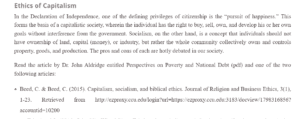Ethics of Capitalism
Write a summary of the main ideas presented in the articles (in your own words), questions that the pieces brought to mind, and how the articles challenged or affirmed your perspective on the ethics of capitalism, particularly from a biblical standpoint.
In the article “Perspectives on Poverty and National Debt,” Dr Aldridge uses poverty theory and relative prevailing income levels for various countries to propose a strategy to close the poverty gap and lower the national debt. Aldridge (2016) uses the data on the relative poverty levels and median income between the United States and European Union countries to examine the association between politico-economic ideologies, poverty, and national debt. Consistently, predominantly capitalist economies generally have lower poverty levels than those based on democratic socialism (Aldridge, 2016).
Are you looking for an authentic the “Ethics of Capitalism essay” copy? Contact us.
Two theories of poverty, case and generic theories, and their implications on strategies to close the poverty gap and lower the national debt are examined. Case theory proposes that socialist policies such as skill-based training, compensatory education, and free welfare are the key to reducing poverty. However, the generic theory proposed under capitalism argues that these policies will only redistribute poverty. Instead, states should focus on increasing opportunities for gainful employment and policies that reward upward socio-economic mobility.
Similarly, Teixeira (2016) further offers insight into the impact of economic ideology on political freedom. According to Friedman, while capitalism enables democracy and political freedom, socialism offers the government the power that allows it to curtail political freedom (Teixeira, 2016). Such government control results in economic repression, which creates the bureaucracy that allows the state to suppress political freedom.
Although capitalism effectively reduces the poverty gap, it is an ideology of greed, intemperance, and self-centeredness (Sire, 2009). It seems to reward individuals for being naturally gifted enough to navigate a system based on competence. It assumes that all individuals are equal and should strive to grab the available economic opportunities to excel. People are innately different in intelligence, strength, and abilities, and it is unfair to expect all people to compete fairly in such an environment (Sire, 2009). Since society is full of inherent inequalities that are out of our control, people can never be economically equal. The least that can be done is for the more fortunate to share our resources to help others as individuals created by the same deity. Besides, we are all responsible for each other. This is not what capitalism encourages.
Nevertheless, since everyone is created equal, everyone deserves to enjoy their fundamental human rights and freedom. Since capitalism allows individuals to pursue their economic interests freely, it empowers them to enjoy political space. This ethical advantage of capitalism prevents citizens from being oppressed by a government that has absolute control of economic activities because citizens depend on it for their economic welfare. In this light, if people are taught to be ethical and considerate in a capitalist society, it is possible to enjoy the benefits of this politico-economic system.
Similar Post: https://eminencepapers.com/comparing-and-contrasting-benjamin-franklin-and-malcolm-x/
References
Aldridge, J. (2016). Retrieved February 27, 2019, from Transtutors: https://files.transtutors.com/cdn/uploadassignments/2519574_1_perspective-on-poverty-and-national-debt.pdf
Sire, J. W. (2009). The Universe Next Door: A Basic Worldview Catalog. ReadHowYouWant.com.
Teixeira, M. (2016, July 29). Why Milton Friedman’s capitalism and freedom are still relevant today. Retrieved February 27, 2019, from Action Institute.: http://blog.acton.org/archives/88316-why-milton-friedmans-capitalism-and-freedom-is-still-relevant-today.html
ORDER A PLAGIARISM-FREE PAPER HERE
We’ll write everything from scratch
Question
Ethics of Capitalism
In the Declaration of Independence, one of the defining privileges of citizenship is the “pursuit of happiness.” This forms the basis of a capitalistic society, wherein individuals have the right to buy, sell, own, and develop their goals without government interference. Socialism, on the other hand, is a concept that individuals should not have ownership of land, capital (money), or industry. Still, the community collectively owns and controls property, goods, and production. The pros and cons of each are hotly debated in our society.

Ethics of Capitalism
Read the article by Dr John Aldridge entitled Perspectives on Poverty and National Debt (pdf) and one of the two following articles:
- Beed, C. & Beed, C. (2015). Capitalism, socialism, and biblical ethics. Journal of Religion and Business Ethics, 3(1), 1-23. Retrieved from http://ezproxy.ccu.edu/login?url=https://ezproxy.ccu.edu:3183/docview/1798316856?accountid=10200
- or Teixeira, M. (2016, July 29). Why Milton Friedman’s capitalism and freedom are still relevant today. Action Institute. Retrieved from http://blog.acton.org/archives/88316-why-milton-friedmans-capitalism-and-freedom-is-still-relevant-today.html
Reading and Viewing Assignment
- Stanwick, P., & Stanwick, S. (2016). It understands business ethics (3rd ed.).
- Chapter 8: Ethics and the Environment
- Chapter 9: Ethics and Information Technology
- Chapter 10: Marketing and Advertising
- Chapter 11: Ethical Issues in the Developing World
- Sire, J. W. (2009). The universe next door: An essential worldview catalogue (5th ed.).
- Chapter 5: Zero Point
- Chapter 6: Beyond Nihilism
Write a summary of the main ideas presented in the articles (in your own words), questions that the pieces brought to mind, and how the articles challenged or affirmed your perspective on the ethics of capitalism, particularly from a biblical standpoint. Be sure to provide APA references for the articles you selected, but note that this is not a formal paper – it should be a summary of your thoughts (500 words maximum). Session 3 Ethics of Capitalism link to submit your assignment by the posted due date. Review the rubric available in Due Dates and Grades for specific grading criteria.

